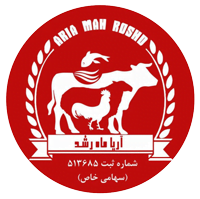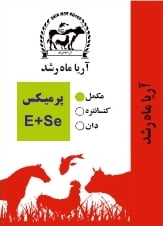Premix vitamin A
Each kilogram of premix A contains the following levels
| IU | 5,000,000 | Vit A |
| mg | 400 | Anti Oxidant |
| gr | 1000 | Carrier Up To |
Symptoms of vitamin A deficiency
- Tremors due to increased cerebrospinal fluid
- Wrinkles and purulent pimples, particularly on the inner tracheal lining
- Increased blood uric acid
- Lack of appetite and reduced growth
- Roughness of hair and ruffled feathers
- Eye and nose discharge
- Corneal darkness and dustiness
- Water accumulation in the knee joints and the sternum area
- Decreased libido in males
- Irregular estrus, abortion, the birth of a weak and blind neonate, and retained placenta after birth in females
- Reduction of fertility and hatching in poultry
Dosage:
750 g to 1 kg per ton of poultry feed
As prescribed by a veterinarian or nutritionist
Premix vitamin D3
Each kilogram of premix D3 contains the following levels
| IU | 5,000,000 | Vit D3 |
| mg | 400 | Anti Oxidant |
| gr | 1000 | Carrier Up To |
Symptoms of vitamin D3 deficiency
- Decreased absorption of dietary calcium and phosphorus
- Softening of bones or rickets in young and growing animals
- Osteomalacia or osteoporosis in adult animals
- Low growth and severe weakness of legs
- Poor feathering
- Decreased quality of the eggshell
- Decreased absorption of calcium and phosphorus from the intestines and bones
- Milk fever (hypocalcemia) or puerperal paralysis
Dosage:
750 g to 1 kg per ton of poultry feed
As prescribed by a veterinarian or nutritionist
Premix vitamin E
Each kilogram of premix E contains the following levels
| IU | 5500 | Vit E |
| gr | 1000 | Carrier Up To |
Symptoms of vitamin E deficiency
- Improper fertility in roosters and reduction of natural reproduction in hens
- Encephalomalacia, subcutaneous effusion, and muscular dystrophy
- Reduced stimulation and resistance of the animal body in critical periods such as stress caused by cold, heat, vaccination, reproduction, pregnancy, and lactation
- Decreased growth and development, egg laying, and egg quality
Dosage:
1-2 kg per ton of poultry feed
As prescribed by a veterinarian or nutritionist
Premix vitamin E + Se
Each kilogram of premix E + Se contains the following levels
| IU | 11000 | Vit E |
| mg | 300 | Selenium |
| mg | 400 | Anti Oxidant |
| gr | 1000 | Carrier up to |
Symptoms of vitamin E + Se deficiency
- Encephalomalacia
- Death of muscle cells
- Subcutaneous fluid seepage in the fetus
- Increased mortality and reduced hatching
- Occurrence of primary fetal losses from 1-3 days of age
- Decreased fertility
- Reduced production and eggshell quality
- Increased lipid oxidation
Dosage:
1-2 kg per ton of poultry feed
As prescribed by a veterinarian or nutritionist
Premix vitamin K3
Each kilogram of premix K3 contains the following levels
| mg | 5000 | Vit K3 |
| mg | 400 | Anti Oxidant |
| gr | 1000 | Carrier up to |
Symptoms of vitamin K3 deficiency
- Lack of blood coagulation in skin bleeding and simultaneous bleeding with coccidiosis disease
- Appearance of blood spots in eggs
- Increased intestinal wall injuries
- Increased bleeding and injuries caused by beak trimming
Dosage:
1-2 kg per ton of poultry feed
As prescribed by a veterinarian or nutritionist
Premix vitamin B Complex
Each kilogram of premix B complex contains the following levels
| mg | 1500 | Vit B1 |
| mg | 4000 | Vit B2 |
| mg | 10000 | Vit B3 |
| mg | 20000 | Vit B5 |
| mg | 2000 | Vit B6 |
| mg | 500 | Vit B9 |
| mg | 20 | Vit B12 |
| mg | 70 | Vit H2 |
| mg | 150 | Choline Chloride |
Symptoms of vitamin B complex deficiency
- Impaired metabolism of carbohydrates, lipids, and proteins
- Growth retardation
- Paraplegia
- Reduction of general resistance
- Angioedema
- Skin lesions
- Incidence of diarrhea
- Lameness
- Ruffled feathers
Dosage:
0.5-1 kg per ton of poultry feed
As prescribed by a veterinarian or nutritionist
Premix vitamin C
Each kilogram of premix C contains the following amounts
| mg | 150,000 | Vit C |
| gr | 1000 | Carrier up to |
Symptoms of vitamin C deficiency
- Reduced resistance of livestock and poultry against infectious diseases, poisoning, and stress
- Increased stress during the rearing period
- No reinforcement of the body’s mucus
- Decreased fertility in roosters
- Reduction of hatching
- Decreased quality of the eggshell
- Reduced resistance and increased stress in calves and foals
- Increased complications resulting from heat stress caused by sudden changes in temperature and density of rearing facilities
Dosage:
750 g to 1.5 kg per ton of poultry feed
As prescribed by a veterinarian or nutritionist










